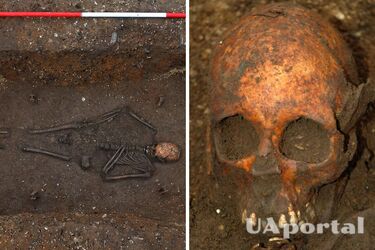Scientists recreate the face of a 16-year-old girl from the 7th century whose remains were found near Cambridge (photo)

Researchers have successfully recreated the image of a 16-year-old girl, dating back to the 7th century, whose remains were found near Cambridge. In addition to reconstructing her appearance, the scientists analyzed her bones and teeth, finding that she was born in Central Europe and moved away in early childhood. This news is reported by researchers from the University of Cambridge, who are preparing to present it at a new exhibition at the Cambridge Museum of Archaeology and Anthropology.
Read also: Archaeologists in Peru found a 3000-year-old mummy under a pile of garbage (photos, video)
The buried girl was approximately 16 years old, and her skeleton was found during archaeological excavations in 2012. She was buried in an unusual way—on a carved wooden bed, wearing elaborate clothes with gold pins and a gold cross decorated with a pomegranate.
This indicates that the deceased belonged to a high social status and was probably one of the first Christians. Bone and tooth isotope analysis showed that she moved to England at about the age of seven from a region near the Alps, possibly from the southern part of Germany. After that her diet changed, with a decrease in protein, which may be related to her new lifestyle.
To get more information about the girl, the researchers created a digital reconstruction of her face with the help of a forensic artist using the parameters of her skull. It was found that she had an eye asymmetry—the left eye was about half a centimeter lower than the right, which could have been noticeable throughout her life. The artist added hair and skin color based on the typical appearance of European women, as no more accurate DNA analysis was available to determine these features.
As a reminder, a Roman military award dating back to 1900 was discovered in Windoland in northern England.
If you want to get the latest news about the war and events in Ukraine, subscribe to our Telegram channel!
